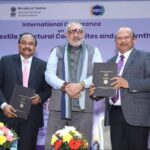Zydex’s Prakalp Sanjivani Protocol — A Holistic & Profitable Approach To Chemical-Free Farming

Prakalp Sanjivani protocol introduces innovative methodologies to address various challenges in agriculture, particularly in transitioning to chemical-free practices, informs Dr. Ajay Ranka, Chairman & Managing Director of Zydex Group, while conversing with Textile Insights
In India, a significant successful demonstration has happened in about 1000 farms who have fully embraced chemical-free cotton cultivation. Additionally, there are an estimated 25,000 to 50,000 farmers who have partially transitioned. However, the success of these farmers in terms of getting higher pricing is limited due to their scattered distribution across India. Without concentrated efforts to promote organic cotton cultivation in clusters, securing premium prices remains a challenge.
Convincing farmers to adopt a cluster-based approach requires a concerted effort from both the industry and individual companies like Zydex. While Zydex is actively promoting organic cultivation through its extensive distributor network, gaining farmers’ trust is a gradual process. Industry players can accelerate this transition by investing in showcasing successful chemical-free organic farming models to farmers, demonstrating the profitability and soil health benefits. Engaging farmers through education and providing tangible evidence of the positive outcomes can catalyze widespread adoption of organic cotton cultivation in clusters.
“Zydex Prakalp Sanjivani protocol introduces innovative methodologies to address various challenges in agriculture, particularly in transitioning to chemical-free practices,” informs Dr. Ajay Ranka, Chairman & Managing Director of Zydex Group. Firstly, by utilizing Zytonic Godhan technology, farmers can efficiently convert organic animal manure and farm residues into high-quality compost, thus reducing reliance on chemical fertilizers. This not only enhances soil fertility but also reduces per acre requirement by 4-6 times.
Secondly, the Zytonic platform enhances soil softeness and porosity, facilitating better root growth and nutrient uptake. By creating a conducive environment like better gas exchange and water holding capacity for beneficial micro-organisms, this technology improves soil health and resilience to abiotic stresses.
Additionally, the Zytonic Suraksha technology enables efficient harvesting of dew water, providing a free water source for plant growth, particularly in rain-fed areas. This innovative approach enhances photosynthesis and overall plant vigour, contributing to higher yields and reduced water stress.
Moreover, incorporating micro-encapsulated neem oil as a natural repellent helps manage pest infestations while boosting plant immunity. By gradually releasing neem oil, the protocol promotes sustainable pest management practices without relying heavily on synthetic pesticides.
Overall, the Zydex Prakalp Sanjivani protocol offers a holistic approach to transitioning towards chemical-free farming, emphasizing soil health, water conservation and natural pest management strategies.
Zydex as an organization is dedicated to helping the world become more sustainable. The company’s innovation efforts are geared towards this goal, something which may be lacking in many other organizations. Zydex does aim to be profitable, but it defines ‘good money’ as money earned sustainably, where its customers also benefit in the long term.
Zydex’s edge lies in its constant research across three stages. In today’s world, ‘sustainability’ is a buzzword that is often misused. The first step towards sustainability is identifying and extending the lifecycle of limited resources. The second step involves substituting these resources with abundant ones. Finally, the third stage is achieving complete recycling, from cradle to grave and back again. Achieving circularity is the ultimate goal of sustainability.
Naturally, no one can leap to the third stage overnight. Zydex’s role is to work on all three fronts, addressing technological hurdles in various industries, whether it is roads, construction, agriculture or textiles. Zydex believes that innovation should not be limited to high-tech sectors, but it should extend to traditional industries too. Zydex’s focus on sectors like agriculture sets it apart.
Zydex’s impact on the future may not be immediately apparent, but it is significant. By conserving limited resources, such as phosphate deposits in agriculture, or by finding alternative sources for nitrogen and potassium, the company is contributing to a healthier future. Keeping our soils healthy ensures a healthy population and enables the organic food chain to thrive.
In essence, Zydex is committed to doing what’s right, not just for profit but for the greater good and the well-being of society, whether that impact is realized in 25 or 50 years. What matters is that Zydex is making a positive contribution.
In general, those associated with Zydex should prioritize opportunities that align with sustainability principles. This philosophy stems from the clear trend: consumers increasingly demand sustainable products for a better future. Educated consumers, in particular, are inclined towards this direction. Therefore, the first aspect Zydex considers is whether a product supports sustainability.
The second aspect is producing goods without harming biodiversity, ensuring the preservation of all coexisting species. Thirdly, it is crucial not to harm the environment during production, avoiding pollution of water and soil. By adhering to these principles, Zydex believes it is doing a commendable job.
In terms of consumer preferences, Zydex has identified seven basic instincts, aligned with the five senses. Products should satisfy these senses—touch, aesthetics, hearing, taste and smell—while also addressing health needs and ego satisfaction. Understanding why consumers spend money and what they value helps the company to tailor its value proposition. If a feature does not add value, the company removes it, following a simple principle akin to the ‘blue ocean’ strategy.
Ultimately, the company’s guiding principle is sustainability, which drives market preferences. The company believes that any company that prioritizes sustainability in its product line will see substantial profits in the future.















